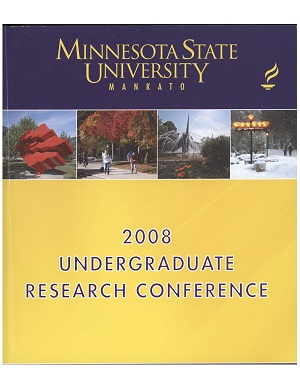The Role of School Nurses Regarding Mental Health for School Aged Children
Location
CSU 201
Start Date
22-4-2008 10:30 AM
End Date
22-4-2008 12:15 PM
Student's Major
School of Nursing
Student's College
Allied Health and Nursing
Mentor's Name
Norma Krumwiede
Mentor's Department
School of Nursing
Mentor's College
Allied Health and Nursing
Description
School nurses, faculty, and administration lack training in mental health education , leaving them with a knowledge deficit on how to provide mental health education to school age children. School nurses are looking for ways to integrate mental health education for school-age children into classroom learning with the eventual goal of increasing student acknowledgement of mental illness in society. The purpose of the research was to identify strategies school nurses use to address the gaps experienced by school-age children who have mental health issues and to implement a mental health program for primary and secondary education students by school nurses. This integrative research review was guided by Stetler's Model of Research Utilization. The findings revealed that school nursing is a specialized practice of professional nursing that advances the well-being, academic success, and life-long achievement of students. To that end, school nurses facilitate positive student responses to normal development; promote health and safety; intervene with actual and potential health problems; provide case management services; and actively collaborate with others to build student and family capacity of adaptation, self-management, self-advocacy, and learning. In conclusion, school-age children are at a critical age where education about mental health illnesses needs to be provided to them. School nurses providing mental health education to students can be a challenge due to the comfort level of mental health knowledge. Educational programs provided by the school nurse need to be set up within the school to assist children in their knowledge of mental health.
The Role of School Nurses Regarding Mental Health for School Aged Children
CSU 201
School nurses, faculty, and administration lack training in mental health education , leaving them with a knowledge deficit on how to provide mental health education to school age children. School nurses are looking for ways to integrate mental health education for school-age children into classroom learning with the eventual goal of increasing student acknowledgement of mental illness in society. The purpose of the research was to identify strategies school nurses use to address the gaps experienced by school-age children who have mental health issues and to implement a mental health program for primary and secondary education students by school nurses. This integrative research review was guided by Stetler's Model of Research Utilization. The findings revealed that school nursing is a specialized practice of professional nursing that advances the well-being, academic success, and life-long achievement of students. To that end, school nurses facilitate positive student responses to normal development; promote health and safety; intervene with actual and potential health problems; provide case management services; and actively collaborate with others to build student and family capacity of adaptation, self-management, self-advocacy, and learning. In conclusion, school-age children are at a critical age where education about mental health illnesses needs to be provided to them. School nurses providing mental health education to students can be a challenge due to the comfort level of mental health knowledge. Educational programs provided by the school nurse need to be set up within the school to assist children in their knowledge of mental health.
Recommended Citation
Herrig, Angela. "The Role of School Nurses Regarding Mental Health for School Aged Children." Undergraduate Research Symposium, Mankato, MN, April 22, 2008.
https://cornerstone.lib.mnsu.edu/urs/2008/oral-session-12/2




